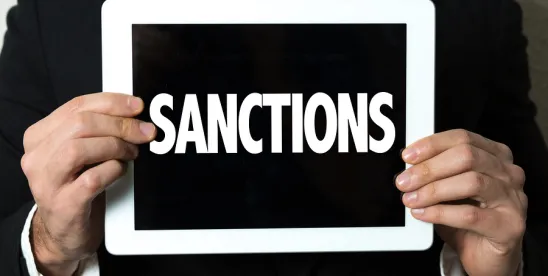As the EU and UK Russian sanctions regimes continue to evolve, export controls are now affecting industries previously not often subject to such restrictions, including the luxury goods sector. This briefing provides an overview of the current sanctions in place targeting luxury goods and what these mean for those who operate within the industry.
As the EU and UK sanctions continue to tighten their grip on Russia through the use of constantly evolving sanctions applicable to the luxury goods market, those potentially subject to such sanctions need to ensure their compliance given the increase in enforcement activities within the European Union and United Kingdom. K&L Gates continues to work with our clients to support their compliance programs and to monitor developments in the EU and UK sanctions regimes and, more widely, across the United States and other territories. If you have any questions regarding the EU or UK sanctions regimes or the issues discussed in this alert, please do not hesitate to contact our lawyers.
UK SANCTIONS TARGETING LUXURY GOODS
In April 2022, the United Kingdom introduced new sanctions to impose strict limits on the export, supply, and delivery of luxury goods to Russia. The ban, contained in regulation 46B of the Russia (Sanctions) (EU Exit) (Amendment) (No. 8) Regulations 2022 (the 2022 Regulations), covers products including handbags; garments, clothing, accessories, and shoes; luxury food items; perfumes; tapestries; pearls, semi-precious stones and jewelry; and sports equipment. The restriction only applies to items where the sale price exceeds a certain price per item or price per liter (excluding value-added taxes but including freight/transport costs). A full list of products subject to the export control ban, and the corresponding price threshold that must be met, is contained at Part 2, Schedule 3A of the 2022 Regulations. Certain exceptions provide, for example, that the prohibition is not contravened by travelers carrying jewelry for personal use.
In December 2023, the UK government introduced further regulations that expanded the prohibitions on luxury goods contained at regulation 46B of the 2022 Regulations. Under the Russia (Sanctions) (EU Exit) (Amendment) (No. 4) Regulations 2023, which came into force on 15 December 2023, not only is the direct and indirect supply, delivery, and making available of listed luxury goods to, or for use in, Russia restricted, but so too is the provision of technical assistance, financial services or funds, and brokering services relating to such controlled luxury items. These additional measures have aligned the United Kingdom’s approach with that of the European Union.
Very similar restrictions apply to the export of certain specified luxury goods to or for use in Belarus.
EU SANCTIONS TARGETING LUXURY GOODS
In March 2022, Council Regulation (EU) 2022/428 amending Council Regulation (EU) 833/2014 (the EU Russian Sanctions Regulation) was published in the Official Journal of the European Union, introducing export controls on luxury goods. Pursuant to Article 3h, the sale, supply, transfer, or export, directly or indirectly, of specified luxury goods to any person or entity in Russia or for use in Russia, is prohibited. The prohibition only applies to luxury goods items specified in Annex XVIII of the EU Russian Sanctions Regulation, provided that such items are also valued over €300 per item (unless otherwise specified). The prohibited items include (among others) caviar, cigars, truffles, certain alcoholic drinks, perfume, leather goods, clothing, precious stones and metals, art, and sporting equipment. Some limited exceptions are available, including one which allows the export of certain specified luxury goods for personal use of persons travelling from the European Union to Russia.
In a similar development to the UK sanctions regime, Article 3h was subsequently amended to also prohibit the provision of technical assistance, brokering services, and other services relating to the export of the banned luxury goods.
More recently, in December 2023, the European Union adopted a 12th package of sanctions against Russia. As part of this package, the European Union amended the rule laid down in Article 3h banning the sale, supply, transfer, or export of luxury goods to or for use in Russia to expressly specify that the ban on the listed luxury goods also applies regardless of whether such goods originate in the European Union.
The European Union also imposed very similar restrictions on the export of certain specified luxury goods to any person or entity or for use in Belarus in June 2024.
RECENT ENFORCEMENT ACTIONS IN THE UNITED KINGDOM AND THE EUROPEAN UNION
In a commercial dispute ruling issued on 5 July 2024, the UK High Court announced that HM Revenue and Customs (HMRC) is investigating whether the director of Valorem Distribution, a high-end perfume distribution company, knowingly exported perfumes to Russia in breach of UK export restrictions on luxury goods. The director was arrested in October 2023 on suspicion of violating Russian export restrictions following a tipoff from a shareholder. The director was released from bail restrictions in March while his case is considered by the Crown Prosecution Service. In June 2023, the shareholder reportedly discovered that the director had been shipping perfume orders to Russia and manipulating the company’s accounts to conceal this activity. In a secret recording obtained by a private investigator commissioned by the shareholder, the director was allegedly recorded as saying that the company was performing well in Russia and was ignoring “government edicts” not to do business there. The shareholder reported this alleged conduct to the Office of Financial Sanctions Implementation in August 2023.
At present, the director is challenging his suspension from the board of Valorem Distribution, as well as the overall investigation, and is arguing that he was not aware that his activities were potentially in breach of UK export controls. The UK High Court disagreed with the director’s arguments in its recent decision, citing the secret recording as “compelling evidence” that he knew his actions were in breach of regulations. The UK High Court noted that the director’s conscious decision not to seek guidance from Valorem Distribution’s in-house lawyer in regard to Russian sanctions also spoke to the matter. The matter remains under investigation.
In the European Union, national competent authorities have also launched enforcement actions in the luxury goods sector. In Germany, a luxury car distributor from Cologne was convicted for selling luxury cars to Russia in breach of sanctions. In a ruling of 24 April 2024, the district court in Cologne held that the dealer had intentionally breached EU sanctions by selling 38 luxury cars and two motorbikes with a total value of around €4.7 million to Russia between April and October 2022. He was sentenced to a suspended term of two years’ imprisonment, a €20,000 fine and 200 hours of community service. In a separate case, German customs investigators raided over 20 residential and commercial premises and four individuals were arrested on suspicion of breaching the prohibition on exporting luxury cars to Russia. According to the German customs authority, the suspects are thought to have sold and exported more than 170 luxury vehicles to Russia in breach of sanctions since the end of 2022. Similarly, a Czech court is reported to have convicted a businessman for attempting to export three premium cars to Russia. He was fined CZK300,000, with an additional €132,000 received as advance payment for the vehicles forfeited to the state, and will be prohibited from trading in motor vehicles for 20 months. Finnish authorities are reported to have seized paintings valued at around €46 million, citing the ban on exporting luxury goods to Russia in April 2024.
WHAT THIS MEANS FOR BUSINESSES
Businesses, shareholders, and senior managers operating in the luxury goods industry should carefully consider the impact of the EU and UK sanctions regimes on distribution and supply chains. Retailers must observe the measures that affect them and ensure compliance at all levels. HMRC’s latest action against a director (see above) demonstrates that the UK government is placing a watchful eye on the luxury goods market and is not afraid to pursue enforcement action when breaches become apparent.
Accordingly, we recommend that luxury goods brands and retailers ensure that they, their subsidiaries, and their distributors have adequate policies and procedures in place to monitor compliance with sanction regulations. Distribution and supply chains should also be reviewed to ensure that products are not being indirectly supplied to embargoed territories or sanctioned individuals by connected suppliers. The introduction of terms and restrictions to this effect in supply chain agreements is strongly encouraged, as well as placing obligations on suppliers to demonstrate that they too have their own robust internal systems and controls in place to ensure compliance with sanctions. This will help reduce risks for retailers in the luxury goods sector of being considered of acting, directly or indirectly, in breach of the relevant sanctions regimes, as well as any associated reputational consequences.






 />i
/>i
